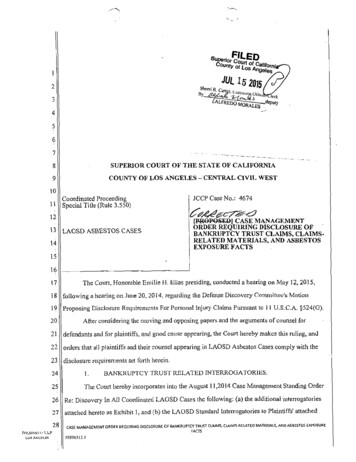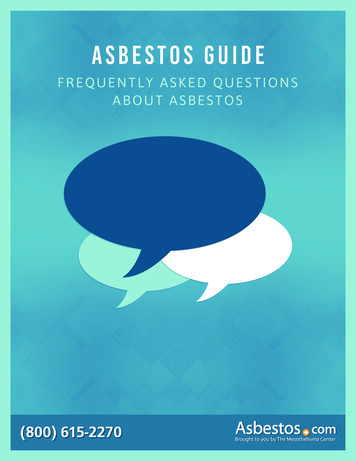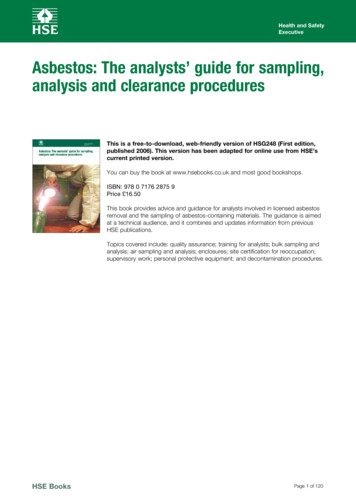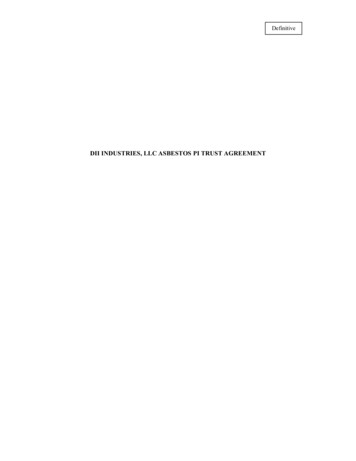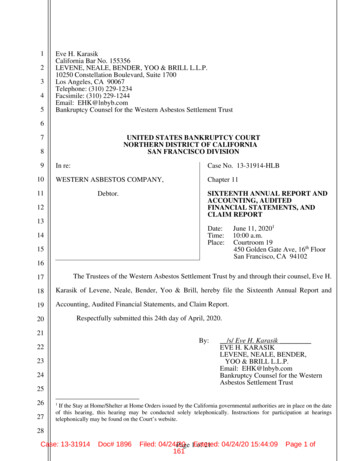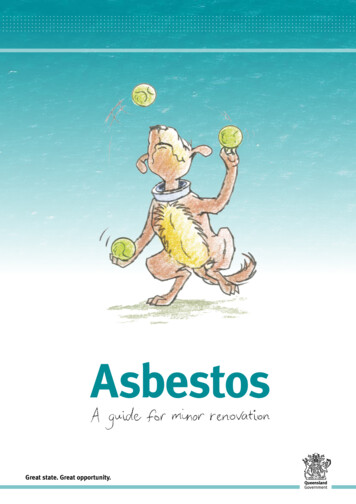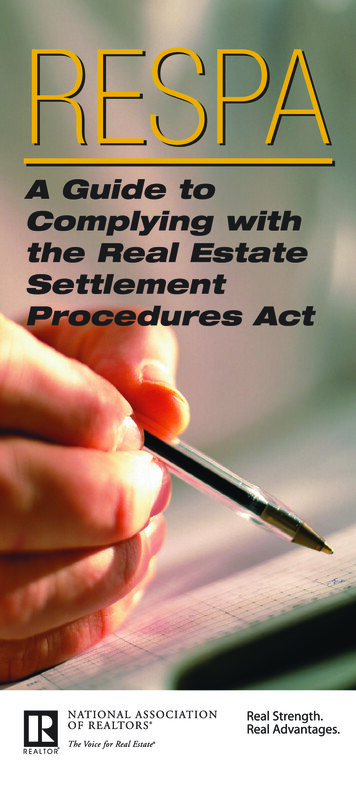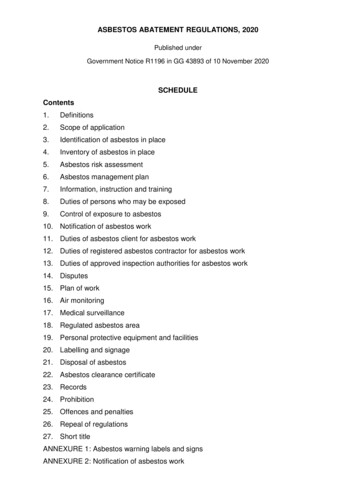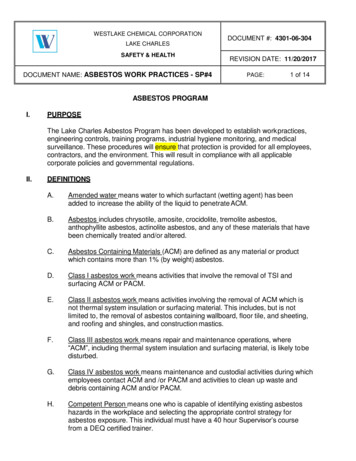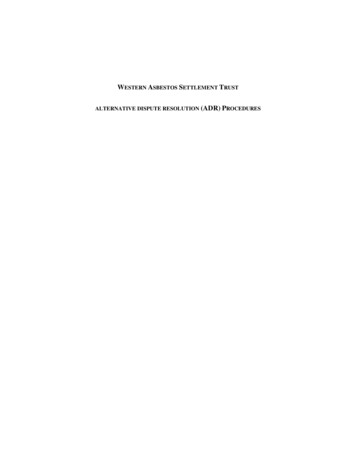
Transcription
WESTERN ASBESTOS SETTLEMENT TRUSTALTERNATIVE DISPUTE RESOLUTION (ADR) PROCEDURES
WESTERN ASBESTOS SETTLEMENT TRUSTALTERNATIVE DISPUTE RESOLUTION (ADR) PROCEDURESPursuant to Section 5.9 of the Western Asbestos Settlement Trust Distribution Procedures (the“TDP”), the Western Asbestos Settlement Trust (the “Trust”) hereby establishes the followingAlternative Dispute Resolution (“ADR”) Procedures to resolve all present and future AsbestosPersonal Injury Claims as that term is defined in the Plan of Reorganization Under Chapter 11 of theBankruptcy Code (hereinafter referred to for all purposes “Asbestos PI Claims”). All capitalizedterms herein shall be as defined and/or referenced within the TDP.These rules are applicable to all ADR proceedings involving asbestos-related claims against WesternAsbestos Company, Western Mac Arthur Co., or Mac Arthur Co. (collectively “Western”). Noclaimant may enter the tort system without first having exhausted the ADR Procedures outlinedbelow. In the context of these procedures, “ADR” refers to both a pro bono evaluation and a bindingor non-binding arbitration proceeding. These rules may be amended from time to time.I. OVERVIEWThese ADR Procedures shall not be applied to resolve conflicts relating to threshold legal issues.This includes, but is not limited to, questions about jurisdiction, standing, choice of law, and statutesof limitations. All unresolved disputes relating to threshold legal issues, including those described inthis paragraph, shall be brought before the United States Bankruptcy Court for the Northern Districtof California, San Francisco Division.The Trust shall appoint a Private Adjudication Coordinator, at the cost of the Trust, to administerthese ADR Procedures. To initiate these procedures, the claimant must make a written request to theTrust. Within fifteen (15) days of a claimant's request for ADR, the Trust will send the claimant anADR packet containing the documents necessary to pursue the ADR process. These ADR Proceduresshall not be construed as imparting to any claimant any substantive or procedural rights beyond thoseconferred by the TDP.The ADR process available to the claimant includes both pro bono evaluation as well as non-bindingand binding arbitration. These ADR Procedures must be pursued by claimants on an individual basis.Claims of different claimants cannot be grouped together even if the claimants are represented by thesame counsel, unless the Trust, in its sole discretion, decides it would be expeditious to conduct ADRproceedings with respect to more than one claim involving different exposed claimants with thoseclaimants’ representative. In such a case, however, the arbitrator must individually value each suchclaim using the valuation factors set forth in the Trust Case Valuation Matrix (“Matrix”) for thespecific injury. These rules and any pro bono evaluator’s or arbitrator’s decision are subject to andmust conform to and comply with the provisions and mandates of the Court Approved Trustdocuments. Section 2.2 of the TDP provides, “All unresolved disputes over a claimant’s medicalcondition, exposure history and/or the liquidated value of the claim shall be subject to binding or nonbinding arbitration, at the election of the claimant, under the Arbitration Rules.” The Arbitration2
Rules are to be established pursuant to Section 5.9(a) of the TDP. Section 5.9(a) of the TDPprovides:“The Trust shall institute Arbitration Rules for resolving disputes concerning the Trust’soutright rejection or denial of a claim, or concerning the claimant’s medical condition orexposure history for purposes of categorizing a claim. Binding and non-binding arbitrationshall also be available for resolving disputes over the liquidated value of a claim. In allarbitrations, the arbitrator shall consider the same medical and exposure evidentiaryrequirements that are set forth in the Matrix. In the case of an arbitration involving theliquidated value of a claim, the arbitrator shall consider the same valuation factors that areset forth in the Matrix.”A deficient claim is not eligible for ADR unless the Trust has issued a rejection of the claim. A claimthat is under review pursuant to the Claims Audit Program provisions of the TDP shall not be eligiblefor participation in the ADR proceedings until that audit review has been completed.A.Initiation of ADR ProceedingsWithin ninety (90) days of receipt of an offer or a rejection of the claim, a claimant initiates ADRproceedings by providing the Trust with a notice of ADR.Within fifteen (15) days of the Trust’s receipt of the notice of ADR, the Trust will send the claimantan ADR packet containing a copy of these procedures and the following:1. A summary outline of the ADR Procedures with the time limits identified.2. Form Affidavit of Completeness, complete copies of all materials submitted to the Trustby the claimant and information in the Trust file, if any, gathered by the Trust from othersources, and copies of the TDP, Matrix and claims processing policies.3. Demand for Pro Bono Evaluation.A claimant must engage in pro bono evaluation before any form of arbitration may be elected. Onlyafter either party rejects a non-binding arbitration award of Total Liquidated Value may a claimantcommence a lawsuit against the Trust in the tort system.The claimant is the moving party and shall have the burden of proof at each stage described below toprove his or her claim by a preponderance of the evidence.It is the claimant’s responsibility to comply with the ADR time deadlines set forth in these ADRProcedures.When the claimant requests pro-bono evaluation or binding or non-binding arbitration, the Trust shallexecute the appropriate election form and agreement. If the claimant requests binding arbitration,then the claimant and the Trust waive their respective rights to seek a jury trial as set forth in the TDPupon execution of the Election Form and Agreement for Binding Arbitration.3
If either party rejects a non-binding arbitration award of Total Liquidated Value, and the claimant hasotherwise complied with the requirements of these ADR Procedures and the Plan, then the claimantmay commence a lawsuit against the Trust in the Claimant's Jurisdiction, as that term is defined inSection 7.3 of the TDP.B.Pro Bono EvaluationPro Bono Evaluation is an evaluation of the claim by an evaluator selected by the PrivateAdjudication Coordinator from a pro bono panel. The panel shall be comprised of experiencedasbestos litigation attorneys familiar with the TDP and Matrix as mutually agreed upon betweenthe Trust Advisory Committee (the “TAC”) and the Trust . Pro bono panelists must partricipate in atwo hour claims processing training provided by the Trust staff. The Trust will provide the TAC witha list of the pro bono panelists annually. The Private Adjudication Coordinator will select a pro bonoevaluator on a rotating basis for each evaluation from the list of pro bono panelists. This selectionwill occur with best efforts to meet thirty (30) days from the date the Trust receives the DemandForm and Affidavit of Completeness from the claimant. All parties will cooperate to cause theselection to occur as soon as practicable.A pro bono-evaluation will be done by document submission. The identity of the pro bono evaluatorwill not be disclosed to the claimant or the claimant’s attorney or the Trust. The injured party’s namewill be disclosed, so the evaluator can conduct a conflict of interest. The Private AdjudicationCoordinator will communicate to the parties, the respective rejection or acceptance of settlementupon the terms of the award of Total Liquidated Value. If either or both parties reject settlementupon those terms, then the claimant may submit an Election Form and Agreement for Binding orNon-binding Arbitration.C.Binding and Non-binding ArbitrationArbitration will be conducted in the format also known as “baseball style” arbitration. Baseballarbitration is a type of arbitration in which each party to the arbitration submits a proposed monetaryaward of Total Liquidated Value to the arbitrator. After a final hearing, the arbitrator will choose oneaward of Total Liquidated Value from the submitted awards of Total Liquidated Value withoutmodification.The arbitrator shall return an award of Total Liquidated Value no greater than the Maximum Valuefor the relevant Disease Level set forth in Section I of the Matrix, unless the claim qualifies as anExtraordinary Claim pursuant to Section IX of the Matrix. In that case, the arbitrator shall return anaward of Total Liquidated Value no greater than the Maximum Value for an Extraordinary Claim asalso set forth in Section IX of the Matrix.If the claimant requests arbitration, either binding or non-binding, then the Trust shall execute theappropriate Election Form and Agreement. The Trust may not decline the claimant's election of eitherbinding or non-binding arbitration, but reserves all rights to reject any award of Total LiquidatedValue in a non-binding arbitration proceeding.4
II.RULES GOVERNING PRO BONO EVALUATIONThe rules of evidence shall apply to pro bono evaluation.A.Election by the Claimant1. Within ninety (90) days of a claimant’s receipt of the ADR packet, the Affidavit ofCompleteness, complete copies of all materials submitted to the Trust by the claimant andinformation in the Trust file, if any, gathered by the Trust from other sources, and copiesof the TDP, Matrix and claims processing policies from the Trust, the claimant mustreturn the Demand Form for Pro Bono Evaluation and Affidavit of Completeness tothe Trust. The claimant or his/her attorney shall personally sign the Demand Form for ProBono Evaluation. The Affidavit of Completeness shall verify that all information to beconsidered in the ADR process has been provided to the Trust while the claim was underreview by the Trust. The claim will not proceed in ADR until the Trust has received acompleted Demand Form and Affidavit of Completeness from the claimant.2. Within fifteen (15) days from the date the Trust notifies the claimant or claimant’s counselof the Trust’s consent to the Demand Form, the Trust shall send copies of the signedDemand Form, Affidavit of Completeness, and Affidavit of Accuracy to the claimant orclaimant’s counsel; and the Trust will also send the ADR packet, DemandForm, Affidavit of Completeness, Affidavit of Accuracy, complete copies of allmaterials submitted to the Trust by the claimant and information in the Trust file, if any,gathered by the Trust from other sources, and copies of the TDP, Matrix and claimsprocessing policiesto the Private Adjudication Coordinator who will forward the materialsto the selected pro bono evaluator at the time the evaluator is selected.B.Selection of the Pro Bono EvaluatorWithin fifteen (15) days of the date the Private Adjudication Coordinator receives the complete filematerials from the Trust, the Private Adjudication Coordinator shall designate the pro bono evaluatorfrom the list of pro bono panelists and notify the parties that the evaluator has been designatedwithout disclosing the identity of the evaluator. The pro bono evaluator shall be selected from apanel of experienced asbestos litigation plaintiff attorneys familiar with the provisions of the TDPand Matrix who have volunteered to serve at the request of the TAC and the Trust. Pro bonoassignments will be made on a rotating basis. The identity of the pro bono evaluator shall not bedisclosed to the claimant or the claimant's attorney or the Trust.C.Extraordinary Claims and Those Reviewed by the Extraordinary Claims PanelIn the event that the Trust or the Extraordinary Claims Panel has determined the claim qualifies as anExtraordinary Claim pursuant to Section IX of the Matrix, the Private Adjudication Coordinator shallso inform the pro bono evaluator. In such circumstances, the parties may submit a final award ofTotal Liquidated Value demand and the pro bono evaluator may issue an award of Total LiquidatedValue, in an amount greater than the Maximum Value for such claim set forth in Section IX of theMatrix so long as the amount is no greater than the Maximum Value for Extraordinary Claims as setforth in Section IX of the Matrix.5
In the event that the Extraordinary Claims Panel determined the claim does not qualify as anExtraordinary Claim pursuant to Section IX of the Matrix, the pro bono evaluator shall not beinformed of the Extraordinary Claims Panel's decision. In such circumstances the claimant mustconfine his/her final award of Total Liquidated Value demand to, and the pro bono evaluator mayissue an award of Total Liquidated Value in, an amount no greater than the Maximum Value for suchclaim set forth in Section I of the Matrix. The pro bono Demand Form will state the Maximum Valuefor each claim. If the claimants’ last award of Total Liquidated Value demand exceeds the MaximumValue assigned to the relevant Disease Level in the Matrix and the Extraordinary Claims Panel hasdeclined to give extraordinary treatment to the claim, that award of Total Liquidated Value demandwill be automatically reduced to the Maximum Value.D.Individual Review ClaimsIndividual Review claims may go to pro bono evaluation, but they are limited to an award of TotalLiquidated Value that cannot exceed the limits set in Section VIII of the Matrix. In suchcircumstances, the Private Adjudication Coordinator shall so inform the pro bono evaluator of thelimits set in Section VIII of the Matrix. The pro bono Demand Form will state the Maximum Valuefor each claim. If the claimants’ last award of Total Liquidated Value demand exceeds the MaximumValue assigned to the relevant Disease Level in the Matrix, that award of Total Liquidated Valuedemand will be automatically reduced to the Maximum Value.E.Submission of Written ArgumentsFifteen (15) days after the Trust sends the complete file materials to the Private AdjudicationCoordinator, the claimant and the Trust shall simultaneously exchange and submit written argumentsto the Private Adjudication Coordinator to be forwarded promptly to the pro bono evaluator.The written arguments shall comply with the following rules:1. The argument shall not exceed ten (10) double spaced typewritten pages. In order topreserve anonymity in a pro bono evaluation, the name of either counsel should not bementioned. The argument may not introduce matters not contained in the documents inthe Trust’s file. The evaluator shall disregard any argument that does not comply with thisrule.2. When a party fails to submit the written argument within the fifteen (15) days, the partywaives written argument and the pro bono evaluator shall disregard any argument receivedafter that time.F.Evaluation of DocumentsThe pro bono evaluation is a document only review with complete anonymity preserved betweeneither counsel and the pro bono evaluator. The documents that the pro bono evaluator may considershall be limited to the following:1. ADR packet containing a copy of these procedures.6
2. Copies of all materials submitted to the Trust by the claimant and information in theTrust file, if any, gathered by the Trust from other sources, as well as copies of the TDP,Matrix and claims processing policies.3. The claimant’s Affidavit of Completeness and the Trust’s Affidavit of Accuracy.4. The written arguments of the claimant and the Trust that comply with the rules for writtenarguments set forth above.5. Before the Private Adjudication Coordinator forwards any documents to the pro bonoevaluator, the Private Adjudication Coordinator will redact all references to either counsel.G.Award of Total Liquidated Value and Procedure for Acceptance/RejectionThe pro bono evaluator shall submit an award of Total Liquidated Valueto the Private AdjudicationCoordinator within thirty (30) days, who will promptly mail it to the parties. The pro bono evaluatormay dismiss the claim if the claimant fails to comply with these ADR Procedures.Fifteen (15) days after receipt of the pro bono evaluator’s award of Total Liquidated Value, theclaimant and the Trust will each communicate in writing to the Private Adjudication Coordinatorwhether they will accept the pro bono evaluator’s award of Total Liquidated Value to settle the claim.If both parties accept, then the Private Adjudication Coordinator will immediately inform both partiesthat they have achieved a settlement and the Trust will send to the claimant the appropriate releaseauthorization letter. Upon receipt and approval of a signed release from the claimant, the Trust shallpay the claim pursuant to the TDP. If either or both parties reject the pro bono evaluator’s award ofTotal Liquidated Value, then within ten (10) days of receipt of both parties’ written communication,the Private Adjudication Coordinator shall send each party a notice of rejection of the pro bonoevaluator’s award of Total Liquidated Value. The notice will not indicate whether the opposing partyhas accepted or rejected the pro bono evaluator’s written evaluation amount.H.TimelinesAny of the above timelines will not be shortened as a result of early submittal of documents by eitherparty.III.RULES GOVERNING NON-BINDING AND BINDING ARBITRATIONArbitration may proceed after rejection of a pro bono evaluator’s award of Total Liquidated Value.A.Election by the ClaimantThe claimant must elect Arbitration within sixty (60) days of receipt of the pro bono evaluator’saward of Total Liquidated Valueby sending written notice to the Trust. Within fifteen (15) days ofthe Trust’s receipt of the notice, the Trust will send the claimant an Election Form and Agreement forBinding or Non-Binding Arbitration.7
B.Selection of the Arbitrator1. As soon as practicable after the receipt by the Private Adjudication Coordinator of the signedArbitration Agreement, but no more than thirty (30) days after the receipt of the signedArbitration Election Form and Agreement, the Private Adjudication Coordinator shall selectthree (3) potential arbitrators from a rotating list kept by the Private Adjudication Coordinator.The Private Adjudication Coordinator shall promptly notify the arbitrators and the parties ofthe potential arbitrators’ selection. If a potential arbitrator is unable or unwilling to serve,then a replacement selection will be made prior to notifying the Trust and the claimant of thepotential arbitrators selected. This selection will occur with best efforts to meet thirty (30)days after the Private Adjudication Coordinator receives the Arbitration Election Form andAgreement. All parties will cooperate to cause the selection to occur as soon as practicable.2. Within fifteen (15) days of receipt of the list of the three (3) potential arbitrators, the claimantor claimant’s counsel and the Trust may identify to the Private Adjudication Coordinator, onepotential arbitrator to be stricken from the list. If one potential arbitrator is left, that personwill conduct the arbitration. If two (2) potential arbitrators are left, then the PrivateAdjudication Coordinator shall appoint one of the two. The parties are then notified by thePrivate Adjudication Coordinator which arbitrator remains and will conduct the arbitration. Ifeither party, or both, fails to exercise the right to strike an arbitrator from the list of potentialarbitrators, the Private Adjudication Coordinator shall appoint from those potential arbitrators.3. Upon appointment of the arbitrator, the Private Adjudication Coordinator shall promptly sendcopies of the Arbitration Election Form and Agreement, and all of the materials utilized in thepro bono evaluation, which include the ADR packet, Demand Form, Affidavit ofCompleteness, Affidavit of Accuracy, complete copies of all materials submitted to the Trustby the claimant and information in the Trust file, if any, gathered by the Trust from othersources, and copies of the TDP, Matrix and claims processing policies to the arbitrator.4. The arbitrator shall not receive the pro bono evaluator’s award of Total Liquidated Value.C.Extraordinary Claims and Those Reviewed by the Extraordinary Claims PanelIn the event that the Trust or the Extraordinary Claims Panel has determined the claim qualifies as anExtraordinary Claim pursuant to Section IX of the Matrix, the Private Adjudication Coordinator shallso inform the arbitrator. In such circumstances, the parties may submit a final award of TotalLiquidated Value demand, and the arbitrator may issue an award of Total Liquidated Value, in anamount greater than the Maximum Value for such claim set forth in Section IX of the Matrix so longas the amount is no greater than the Maximum Value for Extraordinary Claims as set forth in SectionIX of the Matrix.In the event that the Extraordinary Claims Panel determined the claim does not qualify as anExtraordinary Claim pursuant to Section IX of the Matrix, the arbitrator shall not be informed of theExtraordinary Claims Panel's decision. In such circumstances the claimant must confine his/her finalaward of Total Liquidated Value demand to, and the arbitrator may issue an award of TotalLiquidated Value in, an amount no greater than the Maximum Value for such claim set forth inSection I of the Matrix. The pro bono Demand Form will state the Maximum Value for each claim.If the claimant's final award of Total Liquidated Value demand exceeds the Maximum Valueassigned to the relevant Disease Level in the Matrix and the Extraordinary Claims Panel has declined8
to give extraordinary treatment to the claim, that award of Total Liquidated Value demand will beautomatically reduced to the Maximum Value.D.Individual Review ClaimsIndividual Review claims may go to arbitration, but they are limited to an arbitration award of TotalLiquidated Value that cannot exceed the limits set in Section VIII of the Matrix. In suchcircumstances, the Private Adjudication Coordinator shall so inform the arbitrator of the limits set inSection VIII of the Matrix. The pro bono Demand Form will state the Maximum Value for eachclaim. If the claimants’ last award of Total Liquidated Value demand exceeds the Maximum Valueassigned to the relevant Disease Level in the Matrix, that award of Total Liquidated Value demandwill be automatically reduced to the Maximum Value.E.“Baseball Style” Binding ArbitrationAll binding arbitration shall be conducted in the format also known as “baseball style” arbitration asdiscussed above in Section I(C) of these ADR Procedures.F.Submission of Pre-Arbitration StatementsWithin twenty (20) days of the appointment of an arbitrator each party shall submit to the opposingparty and to the arbitrator a written statement (not to exceed ten (10) double spaced pages) containingthat party's positions and arguments. Each party may then submit a supplement to its writtenstatement (not to exceed five (5) double-spaced pages) following the initial pre-arbitration conferenceto respond to the opposing party's positions and arguments and addressing issues raised at the initialpre-arbitration conference. Supplements must be sent to the opposing party and to the arbitratorwithin ten (10) days after the date of the initial pre-arbitration conference. The arguments may notintroduce matters not contained in the documents in the Trust’s file. The arbitrator shall disregardany argument that does not comply with this rule.G.Initial Pre-Arbitration Conference, Scheduling Oral Arguments, TelephoneConference for Oral Arguments1.2.3.Within fifteen (15) days of the receipt of both parties’ briefs, the Private AdjudicationCoordinator shall contact the claimant or claimant’s counsel, the arbitrator, and the Trust toschedule the initial pre-arbitration conference. The initial pre-arbitration conference shall bepresided over by the arbitrator and held by telephone conference call.During the initial pre-arbitration conference, the arbitrator shall schedule the date of thearbitration oral arguments, which shall be conducted by telephone conference.During the initial pre-arbitration conference, the arbitrator shall seek to achieve agreementbetween the parties on narrowing the issues and any other matters that will expedite thearbitration proceedings.If appropriate, or if the parties do not agree on these issues, then the arbitrator must issue ordersgoverning the process.9
H.No DiscoveryThere shall be no discovery. The purpose of the arbitration is to resolve differences between theTrust and the claimant based only on the documents that have been previously submitted to the Trustby the claimant and any other documents relied upon by the Trust to make a settlement offer to theclaimant or to reject the claim.I.No Record of ProceedingsThere will be no record or transcript of the proceedings.J.Postponement of Oral ArgumentsThe arbitrator for good cause may postpone the oral arguments upon the request of a party or uponthe arbitrator's own initiative, and shall also grant such postponement when all of the parties agree.K.Duration of Oral ArgumentsThe arbitrator shall complete the oral arguments in three (3) hours. The arbitrator shall set time limitson the respective presentations, and shall enforce those set limits.L.Evidence at Hearing1. Rules of Evidence: The arbitrator shall require the rules of evidence used in judicialproceedings. The arbitrator shall determine the applicability of any privilege or immunityand the admissibility, relevance, materiality and weight of the evidence offered. In theabsence of a well-founded and substiantiated objection raising a substantial question ofauthenticity or foundation, alli. documents (such as medical records, expert reports, social security records,employment and union records, military records, business records, depositiontranscripts, verified discovery responses, declarations and affidavits, etc.) normallysubmitted in connection with claims will be presumed to be authentic, andii. hearsay objections to such documents, and to discovery responses and declarationsthat clearly disclose the foundation and source of information presented, and theadequacy of the foundation, will be waived.Nothing herein shall prevent the Trust or claimant from arguing the weight, or its absence,to be given to evidence in light of its source, foundation, or provenance.2. Admission of Evidence: The evidence that the arbitrator may consider shall be limited tothe documents supplied to the Trust prior to the execution of the Affidavit ofCompleteness, the Agreement for Binding or Non-Binding Arbitration, underlying datathat was used by the Trust to make initial liquidated value.3. Closing arguments of the claimant and the Trust: The arguments shall be limited to theevidence contained and the issues raised in the documents referred to above.10
M.Option to Waive Oral ArgumentsThe parties may request a waiver of oral arguments. Oral arguments will only be waived if all partiesconsent.N.Arbitration DecisionThe arbitrator shall issue a reasoned decision, not to exceed two pages, no later than fifteen (15) daysafter the date of the close of the oral arguments. Punitive, exemplary, trebled or other like damagesor attorneys’ fees, and prejudgment and post-judgment interest and costs shall not be sought orallowed. The award of Total Liquidated Value shall dispose of all monetary claims presented to thearbitrator and shall determine fully the only issue to be decided: the amount, if any, at which theclaim Total Liquidated Value should be fixed. The arbitrator may dismiss the claim if the claimantfails to comply with these ADR Procedures.O.Non-binding Award of Total Liquidated ValueA party in a non-binding arbitration proceeding that wishes to reject the award of Total LiquidatedValue must notify the other party within thirty (30) days from the date a non-binding award of TotalLiquidated Value is issued. If no rejection is received or sent by the Trust, then the decision willstand and the award of Total Liquidated Value will be deemed accepted by both parties and the Trustwill send to the claimant the appropriate release authorization letter. Upon receipt and approval of asigned release from the claimant, the Trust shall pay the claim pursuant to the TDP.P.Procedure for Rejected Award of Total Liquidated Value1. Rejection by the Claimant: If the claimant wishes to reject a non-binding award of TotalLiquidated Value and wishes to pursue the claim through litigation, then the claimant mustnotify the Trust no later than thirty (30) days from the date of the non-binding award ofTotal Liquidated Value. If the award of Total Liquidated Value does not equal or exceedthe claimant’s award of Total Liquidated Value demand, the claimant must also pay anadministrative fee of 150. Within fifteen (15) days of receipt of notification, and, ifapplicable, payment of the 150 administrative fee, the Trust will send the claimant anauthorization to commence litigation.2. Rejection by the Trust: If the Trust wishes to reject the non-binding award of TotalLiquidated Value, it must send notification no later than thirty (30) days from the date ofthe non-binding award of Total Liquidated Value. Within fifteen (15) days of receipt ofnotification, the claimant may request that the Trust forward the authorization tocommence litigation.Q.Payment of Binding Award of Total Liquidated ValueWithin thirty (30) days from the date the binding award of Total Liquidated Value is issued, the Trustwill send to the claimant the appropriate release authorization letter. Upon receipt and approval of asigned release from the claimant, the Trust shall pay the claim pursuant to the TDP.11
IV.A.GENERAL ADR PROCEDURESADR SubmissionsIf the claimant’s submissions contain materials not previously submitted in support of the claim, thenthe ADR proceedings shall cease and the claim shall be returned to the Trust for processing in theordinary course of business. Whether further processing shall include pro bono evaluation shall beagreed upon
These rules are applicable to all ADR proceedings involving asbestos-related claims against Western Asbestos Company, Western Mac Arthur Co., or Mac Arthur Co. (collectively "Western"). No claimant may enter the tort system without first having exhausted the ADR Procedures outlined below.

